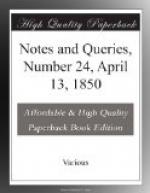HERMES.
Supposed Etymology of Havior (No. 15. p. 230., and No. 17. p. 269.).—The following etymology of “heaviers” will probably be considered as not satisfactory, but this extract will show that the term itself is in use amongst the Scotch deerstalkers in the neighbourhood of Loch Lomond.
“Ox-deer, or ‘heaviers,’ as the foresters call them (most likely a corruption from the French ’hiver’), are wilder than either hart or hind. They often take post upon a height, that gives a look-out all round, which makes them very difficult to stalk. Although not so good when December is past, still they are in season all the winter; hence their French designation.”—Colquhoun’s Rocks and Rivers, p. 137. (London, 8vo. 1849.)
C.I.R.
Havior.—Without offering an opinion as to the relative probability of the etymology of this word, offered by your various correspondents (No. 17. p. 269.), I think it right that the use of the word in Scotland should not be overlooked.
In Jamieson’s admirable Dictionary, the following varieties of spelling and meaning (all evidently of the same word) occur:—
“Aver or Aiver,
a horse used for labour; commonly an old
horse; as in Burns—
“’Yet aft a ragged
cowte’s been kenn’d To mak a noble
aiver.’
“’This man wyl
not obey.... Nochtheles I sall gar hym draw lik
an avir in ane cart’—Bellend.
Chron.
“’Aiver,
a he-goat after he has been gelded: till then
he is
denominated a buck.
“Haiver, haivrel,
haverel, a gelded goat (East Lothian,
Lanarkshire, Sotherland).
“Hebrun, heburn, are also synonymes.
“Averie, live-stock, as including horses, cattle, &c.
“‘Calculation
of what money, &c. will sustain their Majesties’
house and averie’—Keith’s
Hist.
“’Averia,
averii, ’equi, boves, jumenta, oves, ceteraque
animalia quae agriculturae
inserviunt.’”—Ducange.
Skene traces this word to the low Latin, averia, “quhilk signifies ane beast.” According to Spelman, the Northumbrians call a horse aver or afer.
See much more learned disquisition on the origin of these evidently congenerous words under the term Arage, in Jamieson.
EMDEE.
Mowbray Coheirs (No. 14. p. 213.).—Your correspondent “G.” may obtain a clue to his researches on reference to the private act of parliament of the 19th Henry VII., No. 7., intituled, “An Act for Confirmation of a Partition of Lands made between William Marquis Barkley and Thomas Earl of Surrey.”—Vide Statutes at Large.
W.H. LAMMIN.




